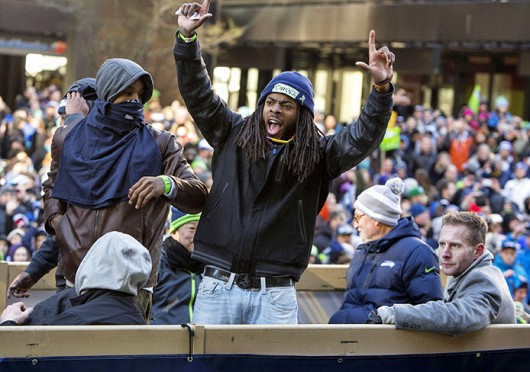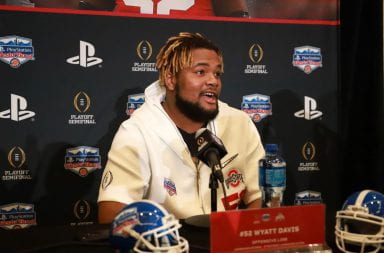
Seattle Seahawks cornerback Richard Sherman waves to the crowd during the Super Bowl Parade Feb. 5 in Seattle.
Courtesy of MCT
In the two weeks between the NFC Championship Game and Super Bowl XLVIII, every person who encountered any type of sports media likely learned the name of Richard Sherman.
The third-year cornerback for the Seattle Seahawks stole headlines from many other worthy story lines heading into the biggest sporting event of the year.
Denver Broncos Quarterback Peyton Manning breaking single-season passing records and leading the Denver Broncos to the Super Bowl in his second season after returning from a career-threatening neck injury?
The NFL’s best offense squaring off against the NFL’s best defense in a true test of an unstoppable force meeting an immovable object?
How would the Seahawks’ offense, with running back Marshawn Lynch arguably being the only player who would rank in the top 10 of NFL players at his position (Lynch finished with 1,257 yards on the ground, good for sixth in the league), keep up with the prolific scoring of the Broncos?
All of these buzzworthy topics took a backseat to the controversy surrounding the 25-year-old defensive back’s on-camera reaction to a sideline reporter’s questions after the Seahawks’ Jan 19 victory.
Sherman’s deflection of a pass intended for San Francisco 49ers wide receiver Michael Crabtree into the waiting arms of linebacker Malcolm Smith sealed the NFC Championship victory and a Super Bowl berth for Seattle.
With the attention of the football world on him, Sherman had set himself up for a potentially huge payday and possibly some new endorsement deals.
After Sunday’s game, Sherman’s name did not make the front page of many newspapers after he turned in a quiet but efficient performance in Seattle’s 43-8 victory over Denver.
He was credited with three tackles and one pass deflection in a game where his most noticeable effects on the game were the two times play was stopped while Sherman sprawled on the turf in pain.
Sherman was carted off the field during the fourth quarter with a high ankle sprain, but returned to give a relatively subdued interview — a far cry from the outburst that garnered so much attention two weeks prior.
He had practically forcibly grabbed the spotlight while enthusiastically proclaiming himself to be the “best corner in the game” in the postgame interview with Fox’s Erin Andrews after his team’s 23-17 win.
Despite not making any spectacular individual plays or boasting an impressive stat line, Sherman played an integral role in a team effort that held Denver and its NFL MVP quarterback to one score in the entire game.
Manning never looked comfortable in the pocket, and he often checked down to short-yardage passes. He threw two interceptions, lost a fumble, was sacked, was involved in a safety after his center snapped the ball over his head, and had eight of his passes batted down in a disappointing outing.
Sherman might not have earned a spot on the Super Bowl highlight reel, but at least he did not turn in a dud like Manning.
Most importantly, Sherman added “Super Bowl Champion” to a résumé that already includes being a two-time first-team All-Pro and Stanford graduate.
Hopefully, his calmer postgame demeanor this time around will silence his critics, at least temporarily. Social media exploded with derision and racial slurs directed toward Sherman after his outspoken on-air rant in the Andrews interview.
Despite being loud, Sherman does not have any obvious character flaws or negative history and would actually make a great role model for young athletes.
He was salutatorian of his high school class of Dominguez High School in Compton, Calif., and attended a college known for academics instead of athletics, graduating after five years with a degree in communications and starting a master’s instead of leaving early for the NFL.
“I really wanted to make that known to people that you can go to Stanford from Compton,” Sherman said when he was drafted.
After the deciding play in the NFC Championship Game, Sherman congratulated Crabtree by saying “helluva game” and extending a handshake. Crabtree reacted by shoving Sherman’s facemask, which presumably was the catalyst for Sherman’s now-infamous rant.
The world should judge Sherman on his credentials and achievements instead of his volume in one interview. He’s proven himself to be one of the best corners in the league, if not the best, as he claimed. Or, if Sherman goes off on another rant, maybe he can rant about his support of academics, good sportsmanship and opposition of illicit drugs. It would be hard to call him a “thug” after a rant like that.


